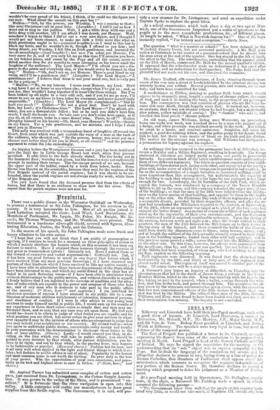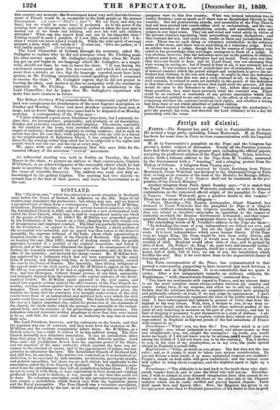IRELAND.
Kilkenny and Limerick have held their pro-Papal meetings, each with a good show of laymen. At Limerick, Lord Dunraven, a convert to Bornanism, Mr. Monsen, M.P., Mr. Hawley, J.P.' Major Gavin' M.P., and Sir Yore de Yore. Bishop Ryan presided at Limerick, and Bishop Walsh at Kilkenny. The speeches were very loyal in tone, but stout in defence of the temporal power. The Earl of Fingall has published a letter to Dr. Cantwell, strongly expressing his dissent from some of the resolutions to be proposed at a meeting in Meath. Lord Fingall is head of the Roman Catholic nobility of Ireland. He says he signed the requisition for the meeting on the understanding that its " solo ' object was to express sympathy fir the Pope. But he finds the language of the resolutions too severe, and he altogether declines to concur in two, laying down as a line of policy for Roman Catholics, that Members of Parliament shall oppose every Ad- ministration which consents to recognize the separate independeeee of any portion of the Roman States. He therefore declines to attend a meeting which proposed to fetter his judgment as a Member of Parlia- ment.
At a pro-Papal meeting held in Queenstown, Mr. Gallagher, magis- trate, in the chair, a Reverend Mr. Fielding made a speech in which occurred the following passage- " The Government knew very well that the people of this country hesi- tated very little, or would not care much, if Napoleon III. should step into
this country any moment ; the Government knew very well that the Govern- ment of France would be as acceptable to the Irish people as the present Government. (.4 voice—" 77sat's a fact.") We are loyal, and only too loyal, but we would be more loyal if protected. As to the peace of the country, how can the people be expected to protect it when the poor man is turned out of his house and holding, and sees his wife and children wretched ? What can you expect from any one in his miserable state ? Putting myself in such a Dam, if I saw this, what would I do? I de- clare I would not know w t I would do. While the wild spirit of revenge prompts a man, what will satiate it ? It cries out., Give me justice, or I will justify myself.' " (Great cheering.)
The Lord Chancellor of Ireland, through his secretary, asked Mr. Gallagher to explain why he did not interpose when Mr. Fielding made his ultra-marine speech. Mr. Gallagher explains that when Mr. Field- ing got up and began to use language which Mr. Gallagher, as a magis- trate, should not hear, he rose to leave the chair. "It was during the excitement consequent upon this movement, and which did not occupy more than a minute or two, that the language reported must have been spoken, as Mr. Fielding immediately ceased speaking when I consented to resume the chair." Mr. Gallagher regrets that he did not persist in leaving the chair, and declares he has no sympathy with the sentiments expressed by Mr. Fielding. The explanation is satisfactory to the Lord Chancellor ; but he hopes that Mr. Gallagher's experience will make him more cautious in future.
The BelfastNerthern Whig remarks that the commercial capital of Ire- land was conspicuous for drunkenness of the most flagrant description on Sunday and Monday. Never had more drunken creatures been seen at large, and no fewer than sixty-two cases had to be disposed of on Monday morning. A correspondent of the Whig says- " I have witnessed a good many Christmas Days here, but I solemnly de- clare that, for intemperance, immorality, and profanity of all description, Sunday and yesterday exceeded all former displays. The streets, especially in the outskirts of the town' were crowded with drunken persona in all stages of inebriety, from stolid stupidity to raving madness ; and to such an extent was this the case that, while paying a visit with my wife to a friend in the neighbourhood of Eglintoun Street, I was compelled to leave her there for the evening rather than allow her to be subjected to the sights and sounds which met the eye and the ear at every step."
We agree with our able contemporary that this says little for the vaunted efficacy of the notorious "revival" movement.
An influential meeting was held in Dublin on Tuesday, the Lord Mayor in the chair, to present an address to their countryman, Captain M'Clintock, as an acknowledgment of the successful efforts which he had made to ascertain the fate of the brave men who had lost their lives in the cause of scientific discovery. The address was read, and duly ac- knowledged by the gallant Captain. The meeting had two objects—to reward him to the best of their power, and leave the Government to do the rest.



























 Previous page
Previous page